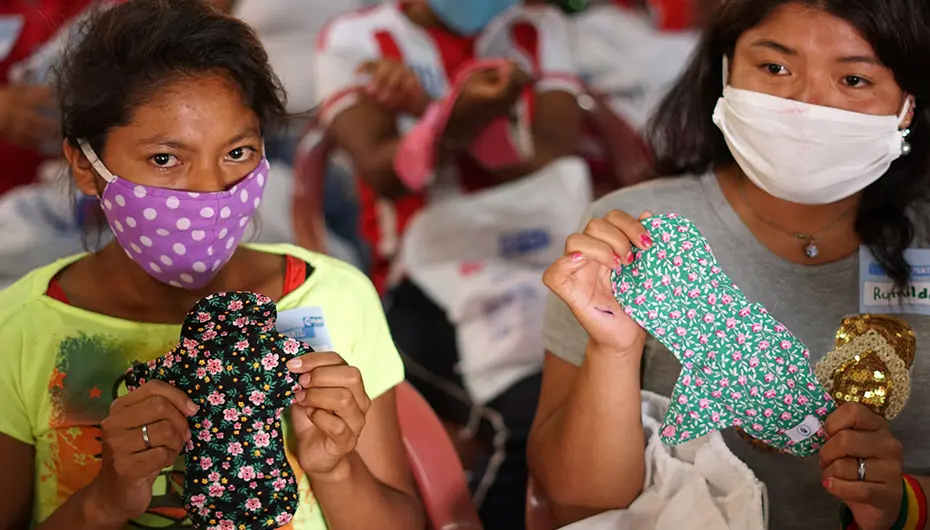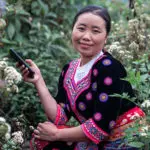Media Centre - Media release - 28 May 2021
Periods in a pandemic 2021: New report reveals COVID-19 has worsened menstrual health for girls globally over the last 12 months

A new Plan International Australia report has revealed that more than a year since the start of the COVID-19 pandemic, girls, women and gender diverse people who menstruate around the world are facing even more serious challenges when it comes to managing their periods.
Launched today by the charity for girls’ equality for World Menstrual Hygiene Day, Periods in a Pandemic: One Year On In 2021 looks at how COVID-19 has impacted menstrual health and hygiene (MHH) more than a year since the start of the pandemic. A sequel to last year’s Periods in a Pandemic research, it includes interviews with 62 water, sanitation and hygiene (WASH) experts and sexual and reproductive health rights (SRHR) specialists across 22 countries that Plan International works in, together with case studies from countries such as Indonesia, Nepal and Lebanon.
The research comes as many of the countries surveyed – including our nearest neighbours in Asia and the Pacific – are experiencing shocking second and third waves of COVID-19, while some are being hit hard by the virus for the first time. Curfews and lockdowns lead to loss of income and disruption to supply chains, making access to sanitary products significantly more difficult.
“We are not going out at all, which is very hard,” said 15-year-old Shahid, a Syrian refugee living in Lebanon. “Only one family member is allowed to go outside to buy urgent needs, which is usually my father or my brother.”
Women, girls and children are not allowed to go anywhere. (So) it’s a big challenge to buy sanitary pads, I can’t go by myself to get them and I don’t have the money needed.The research reveals that managing menstrual health has become significantly more challenging – particularly for girls menstruating for the first time – where there are shared toilet and bathroom facilities, especially in areas where COVID-19 is rife. Access to timely and accurate menstrual health information and guidance is limited when schools and community centres are closed. People who menstruate are also often at the frontlines of fighting the pandemic and caring for others.
The report further reveals that globally, almost 60% of girls in the countries surveyed are now facing a vacuum of crucial information and basic services on menstrual hygiene management (MHM) – and were in fact able to access even less information and basic services compared to this time last year.
One WASH advisor in Canada noted: “Schools are a key place where young people learn about various health issues, often for the first time, including MHH. With the school closures, there are many who have missed out on receiving this information in the past year due to the pandemic.”
Along with severe shortages of products, rises in the prices of pads and tampons and less access to clean water, the new report has also exposed the toll that extended lockdowns, school closures and crowded, confined households have had on people’s menstrual health and hygiene.
Almost half (45%) of girls and gender diverse people who menstruate were facing decreased privacy when managing their periods, therefore struggling to change menstrual products, clean themselves hygienically and dispose of menstrual products after use. In some countries, this lack of privacy had also led to period stigma and myths being amplified, with many girls and gender diverse people who menstruate feeling they had to hide blood stains and other signs of their menstruation from family members.
When the government told us to stay at home to avoid the coronavirus, I was worried… it’s uncomfortable to talk about (periods at home). I feel embarrassed to ask for pads from girls who live nearby,- said 18-year-old Yalen from Indonesia.
Menstrual health experts in Australia noted that the pandemic had forced many charities working to target period poverty and stigma to close their doors, leaving many lower income people unable to access period products. Australian not-for-profit Share The Dignity noted that in the last 12 months there had been a 30% increase on the average usage of their Dignity Vending Machines (dispensing free period pads and tampons).
“This new survey has laid bare how COVID-19 and its secondary impacts have exacerbated period poverty – the struggle many low-income girls and women face while trying to afford menstrual products – and period stigma right across the globe, from India to Indonesia to Italy,” said Plan International Australia CEO Susanne Legena.
These issues existed before the pandemic, but we know that this virus has in many cases made the situation worse – especially for girls.“Periods don’t stop during a pandemic. For millions of girls in the countries where Plan International operates, privately and safely managing menstruation and addressing the taboo and stigma associated with it is vital to ensuring their human rights, health and dignity – and these are all under threat right now as COVID-19 continues to devastate the world.”
Key findings:
- Lack of access to information and services – 59% said this had worsened since May 2020 (when 54% agreed this was a challenge caused by COVID-19)
- Restricted access to products, through shortages or disrupted supply chains – 52% said this had worsened since May 2020 (when 73% agreed this was a challenge caused by COVID-19)
- Lack of privacy for people who menstruate to manage their periods at home privately, leading to increased stigma and shame – 45% observed this was a challenge caused by extended lockdowns and school closures.
- An increase in price of products – 41% said this had worsened since May 2020 (when 58% agreed this was a challenge caused by COVID-19)
- Reduced access to clean water to manage periods – 27% said this had worsened since May 2020 (when 51% agreed this was a challenge caused by COVID-19)
- A less hygienic environment for disposal of products – 32% said this had worsened since May 2020 (when 47% agreed this was a challenge caused by COVID-19)
- Increased stigma, shaming or harmful cultural practices – 23% said this had worsened since May 2020 (when 24% agreed this was a problem caused by COVID-19)
Periods in a Pandemic: One Year On In 2021 provides recommendations on how to include MHH within a COVID-19 response, and spotlights a new, successful pilot project in Indonesia that focused on combating period poverty for girls in the east of the archipelago. The report also includes key learnings, after more than a year of COVID-19, on the benefit of online MHH education sessions – especially for boys – and the importance of building period education into all school curriculums.
Plan International is calling on all governments and health agencies to urgently assist girls, women and people who menstruate to manage their periods safely and with dignity.
For further comment please contact Plan International Australia public relations advisor Claire Knox on 0452326549 or media and ambassador manager James Norman on 0451291775. Please find the report here and images for use here.
Plan International Australia is currently distributing dignity kits to communities in need all around the world. A Dignity Kit has all of the essentials people who menstruate need to manage their periods during a crisis like COVID-19. The kit includes menstrual pads, body soap, washing soap for clothes, toothbrushes, shampoo and toilet paper. You can pay it forward and purchase a dignity kit, which will help a girl manage her period, here.
About Plan International Australia
Put simply, we’re the charity for girls’ equality. We tackle the root causes of poverty, support communities through crisis, campaign for gender equality, and help governments do what’s right for children and particularly for girls. We believe a better world is possible. An equal world; a world where all children can live happy and healthy lives, and where girls can take their rightful place as equals.
Media contacts


